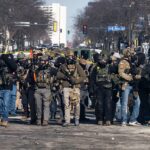Roise Njeri Mwaura was taking a short afternoon respite from her five-month-old son and from her daily hours of difficult cleaning work, to get her hair freshly braided at a Black-owned beauty salon in Beirut.
Suddenly: an ear-shattering boom. The building around her shook as tiny shards of glass sprayed across the room like sharp bits of a broken mosaic. One of them sliced across her earlobe. “Went we went outside, we started seeing smoke, and we thought: ‘Maybe there’s a war.’”

It was Aug. 4, 2020.
Thousands of tons of improperly stored ammonium nitrate had just caught fire and exploded at Beirut’s port, causing one of the largest non-nuclear explosions in history. Hundreds of buildings in the heart of the capital had just been shredded to bits in a matter of seconds, killing more than 200 people and, eventually, sparking a beleaguered investigation that remains stalled to this day.

But Roise, a 27-year-old migrant domestic worker from Nairobi, Kenya, had no way of knowing all of that just yet. First, she realized, she needed to find her baby son Steve.
“The Story of Humanity”
“Every African pattern tells a story,” according to Viany de Marceau. In a one-room atelier near the Beirut port this past July, she flips through the rack of dresses, shirts, and skirts she’s hand-sewn from fabrics collected from across Africa: colorful blue, white, green and rainbow prints from South Africa, Mali, and elsewhere. And, of course, her favorite: a black-and-white geometric print from her home region of western Cameroon. “This one tells the story of humanity,” she says, tenderly.

Viany always dreamed of being a fashion designer, after learning to sew at age nine. She imagined herself traveling to France, starting her own fashion line, showing off her work in Paris Fashion Week. She began secondary schooling in sewing after graduating high school back in Cameroon.
So when a kafala recruiter came to her about 10 years ago, offering her a chance at that dream, Viany jumped at the opportunity. “She said I could come to Lebanon and work for six months, and then I’d be able to go study in France,” Viany remembers. The offer was too good to refuse; she quit fashion school after less than a year and packed up her things for Lebanon.
“Modern Slavery”
Around 250,000 mostly female migrant domestic workers live and labor in Lebanon through the country’s kafala work sponsorship system — critics and survivors have dubbed it “modern slavery.”
Through kafala, Lebanese employers — usually private households or companies in want of custodial staff — hire special offices to recruit women from foreign countries who travel to Lebanon and work as cleaners, nannies, and cooks.

Often tied by their work and employers to Lebanon’s domestic sphere, including the thousands of homes that line the Beirut port, at least six female migrant workers were killed in the 2020 blast. Others were injured, or lost their homes, passports, and belongings among the wreckage. Survivors told Inkstick they believe the death toll among migrant domestic workers is higher, but thanks to improper documentation, it is likely impossible to know the true number.
Either way, the domestic workers impacted that had come from Ethiopia, Kenya, Sri Lanka, the Philippines, and elsewhere, following promises of good pay and a better life in Lebanon.
That’s not what greeted them.
“They Took My Winter Clothes”
Flashing lights, plastic potted plants, and posters that read “LET YOUR LIGHT SHINE!”
“Give me more courage! To do what is right! Before my Lord!” proclaims the Nigerian pastor of this tiny, hole-in-the-wall pentecostal church in Beirut, attended mostly by workers from Nigeria and Kenya. “Amen!” the congregants respond.
Among them is Mercy Mgoki, a quiet woman in a prim blue hat.
Mercy, who is married and has several children, was struggling with family problems at home in Nairobi, Kenya, when she made the decision to follow a kafala recruiter to Lebanon.

The first thing she did after landing in Lebanon: sit in a back room at Lebanese passport control with dozens of other soon-to-be migrant domestic workers as their new Lebanese employers came in, one by one, to pick them up.
Mercy’s employer, she soon learned, was a young mother with a mean streak. “They took all my winter clothes and hid them away,” Mercy remembers, sitting at the back of the church sanctuary one Sunday after service. They also took away her passport, and kept her locked in their Beirut apartment with no cell phone.
Over the years, the church here in the diverse Nabaa suburb just outside Beirut became something of a haven.
In the wake of the 2020 blast, it became an impromptu aid center as well. Some organizations “were turning away the foreign workers and only helping Lebanese,” Mercy remembers. So the church’s leader, Pastor Joseph Abolade, allowed them to sleep in the prayer hall —- some of them had nowhere else to go.
“Thought It Was a War”
Still, others tried to simply keep moving on after the explosion.
Mariam Bai Sasay, a bubbly young woman in her 20s from Sierra Leone, first came to Lebanon as a domestic worker when she was just 17 years old. By 2020, she was living in her own place a few minutes outside of Beirut, and doing freelance cleaning gigs. On Aug. 4, she decided to head over to Beirut’s Burj Hammoud district to buy cleaning supplies.
“I was there in the market when the explosion happened,” Mariam remembers. It was 6:07pm.
“Oof! It was shaking, and all of a sudden, I heard a big sound. I thought it was a war. … I saw a lot of people injured [and] I saw blood on the street.”

The moments after the blast were a blur of broken glass and screams. Next was the mushroom cloud of toxic pink smoke hanging over the city.
Viany remembers a woman who had been showering at 6:07pm, when the explosion happened, who simply ran down into the street naked, too afraid to put on clothes. There was another woman, barefoot, running for her life across the piles of glass shards. Another had been cleaning a window at the time of the blast, and was hurt by the broken bits.
Still in the hair salon, Roise would need to find her baby son Steve. She had given birth to him here in Lebanon, to a Syrian father who would later leave her. Somehow, amid the chaos, she fetched him from her friends, who had been watching him in a neighborhood closer to the port, and managed to bring him back home to their apartment. “I felt so glad, because they were telling us there where he was had been even worse.”
Lingering Fears
The two of them would still face trouble. Months later, thanks to the sheer force of the blast, the concrete roof of their tiny one-room apartment partially collapsed, narrowly missing the bed. With nothing but sky above them, the winter rains poured in — they had to sleep next door with their neighbor, who is also a domestic worker.
Eventually, she says, “an NGO fixed the roof.” It’s now covered in plastic slats — enough to stave away the rain but not enough to keep the moisture from seeping dangerously into the surrounding, cracked concrete walls.
There’s little she can do though with the money she makes as a cleaner, as it’s already a stretch to afford the $200 monthly rent. “I’m afraid to move to a different apartment, maybe the landlord will raise the rent.”

There are the intangible fears that linger as well. Roise is still afraid when she hears loud noises like airplanes and celebratory gunfire. Mariam, too.
“And I fell into a deep depression,” Mariam says — feelings she’s still working through. “During the day I’m very active, it’s just when I go home, and I think about everything I’ve seen, about the people who have passed away.”
Sweeping Away Glass
Viany often likes to use her scrap bits of traditional fabrics to express her emotions. After one incident of seeing people wear blackface makeup in Lebanon this past year, she sewed a patchwork T-shirt, angry knife-like black bits of fabric crisscrossing the front.
But in the days and weeks after the 2020 blast, she simply couldn’t create. “I fell into a deep depression.”

Instead, she rallied together a few friends and some cleaning supplies, and headed over to the neighborhoods of Beirut most damaged by the port. “We volunteered cleaning up houses,” she remembers. “We had families asking us wherever we went, ‘Can you please help us?’” They spent the day wiping up blood and glass.
Somehow, bit by bit, the shards of broken windows and furniture dissipated from the streets. Many of the migrant domestic workers still in Lebanon at the time of the blast also left, demanding repatriation to their home countries.
Rebuilding Lives
The women, too, are trying to rebuild what they can of their lives in Lebanon. Roise is putting her son through school and trying to teach him Swahili, in the hopes of taking him home to Kenya someday. Viany has her sewing, while Miriam and Mercy are immersing themselves in migrant worker solidarity groups.
All four say they want to help prevent other women like them from coming to Lebanon.
Four years on, little has been done to bring justice to those responsible for the deadly blast. A Lebanese-run investigation headed by judge Tarek Bitar has ground to a halt amid accusations that key politicians knew of the port’s improperly stored chemicals and did nothing to safely dispose of them.

All the while, the port’s once-towering grain silos still stand, half-crumbled amid the wreckage, also still littering the blast site with twisted bits of corrugated metal and iron rebar.
Despite the pain of seeing it, Viany says she feels the wreckage should remain there.

“It’s a part of the story,” she says, among her printed fabrics and sewing machines. This past year, she managed to open a small atelier with space provided by The Bread Oven, a local NGO that runs a community center and kitchen.
Just minutes away from her workspace, the mangled port. “I am not Lebanese; I am African. But that thing is for me. I was here that day.”
** All photos by João Sousa. Sousa is a photojournalist based in Lebanon and focused on social issues.














